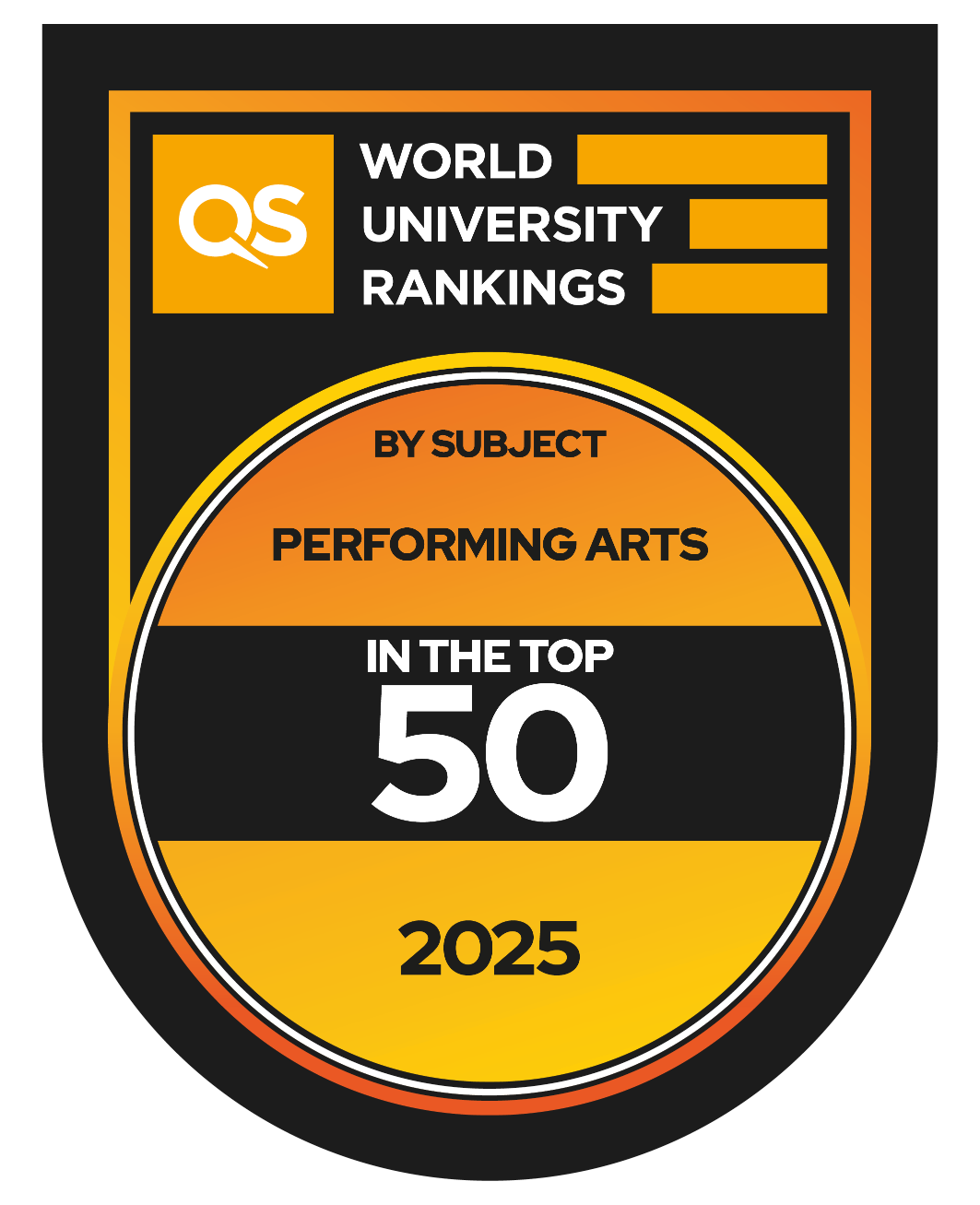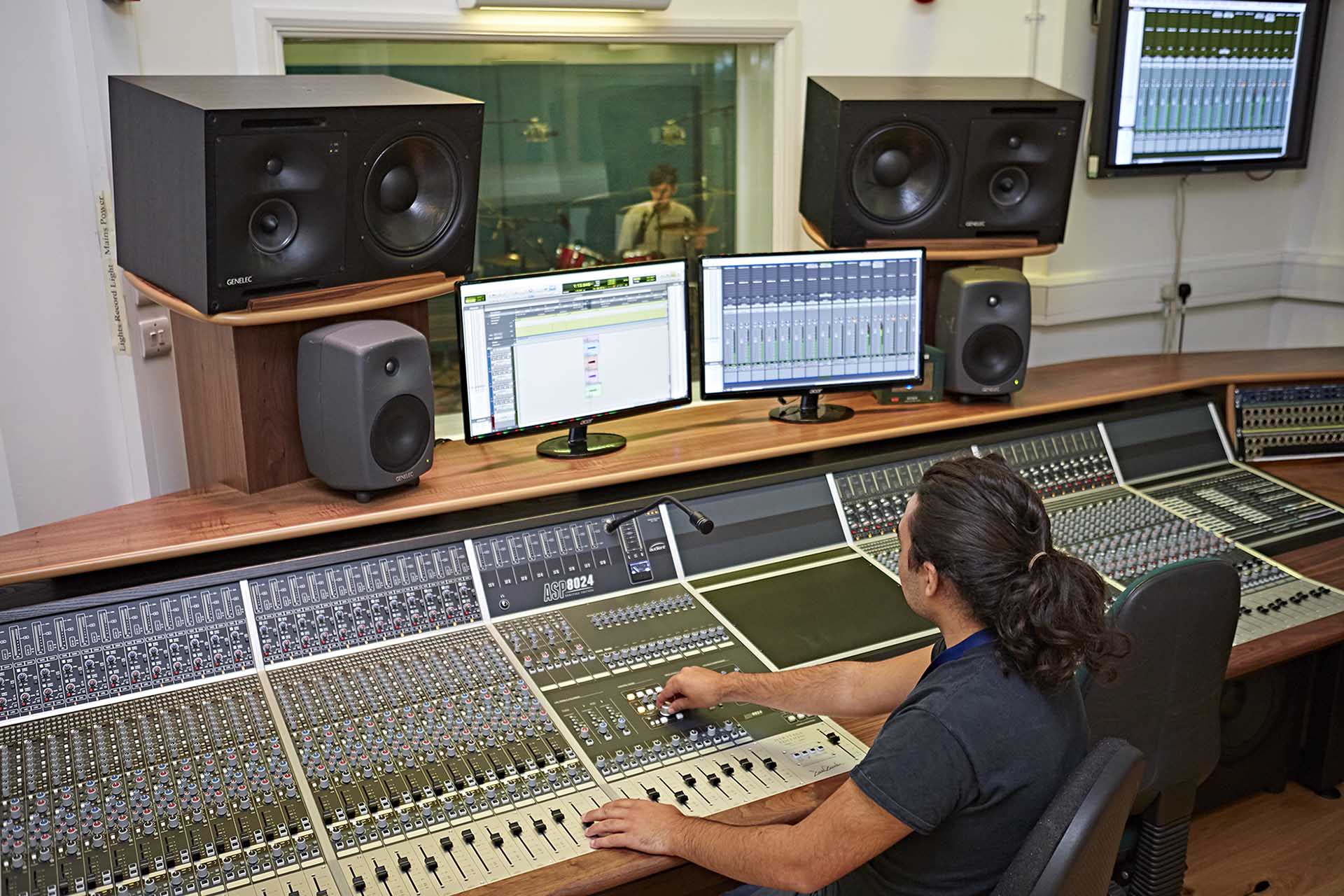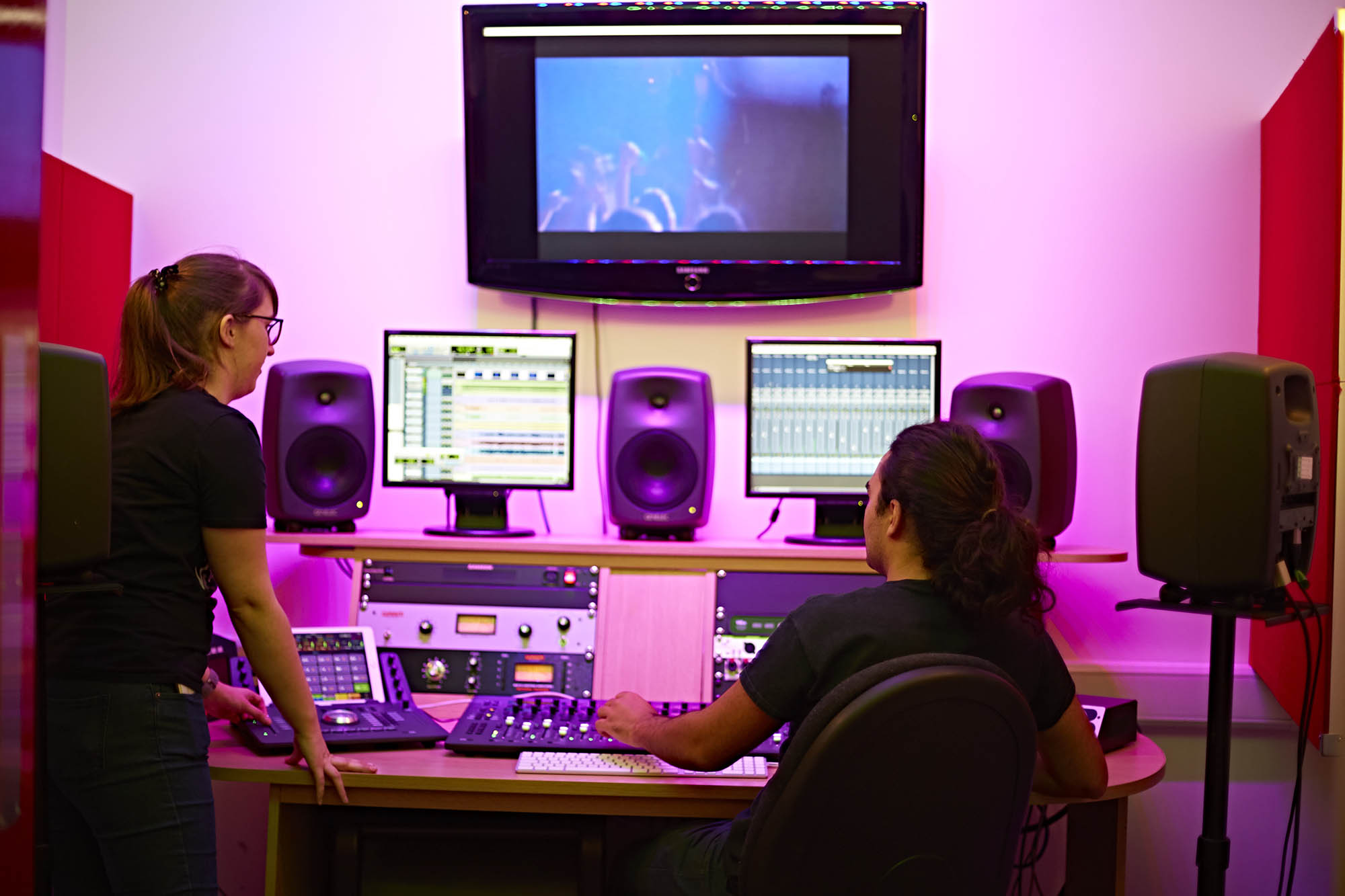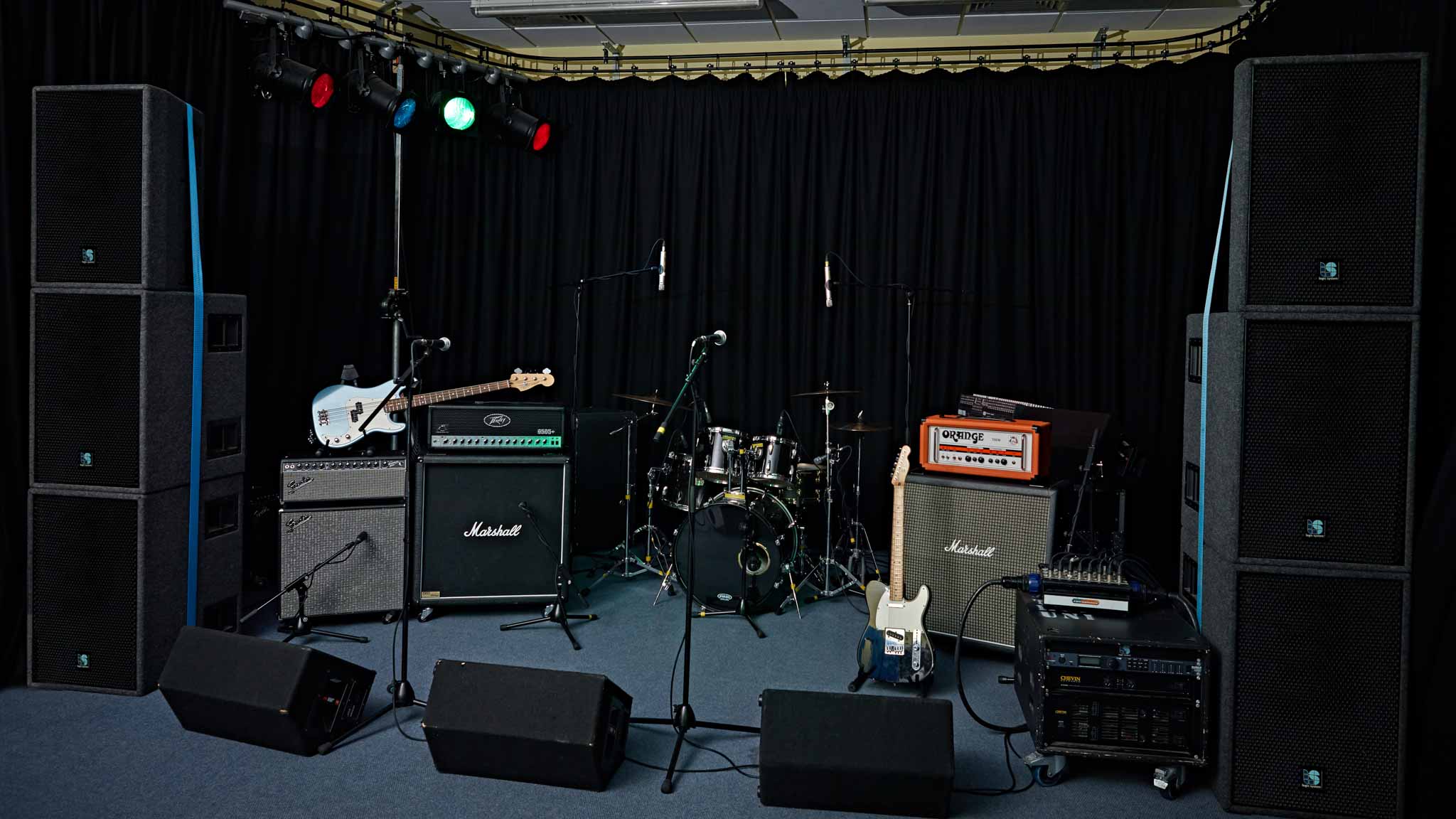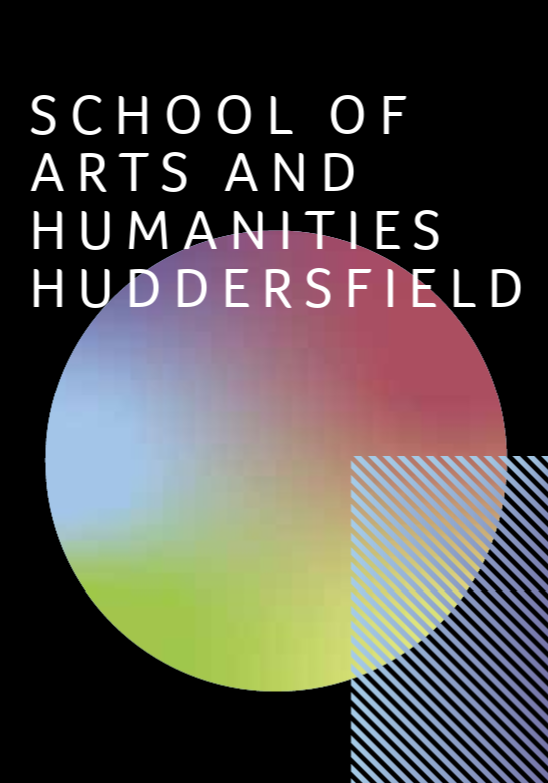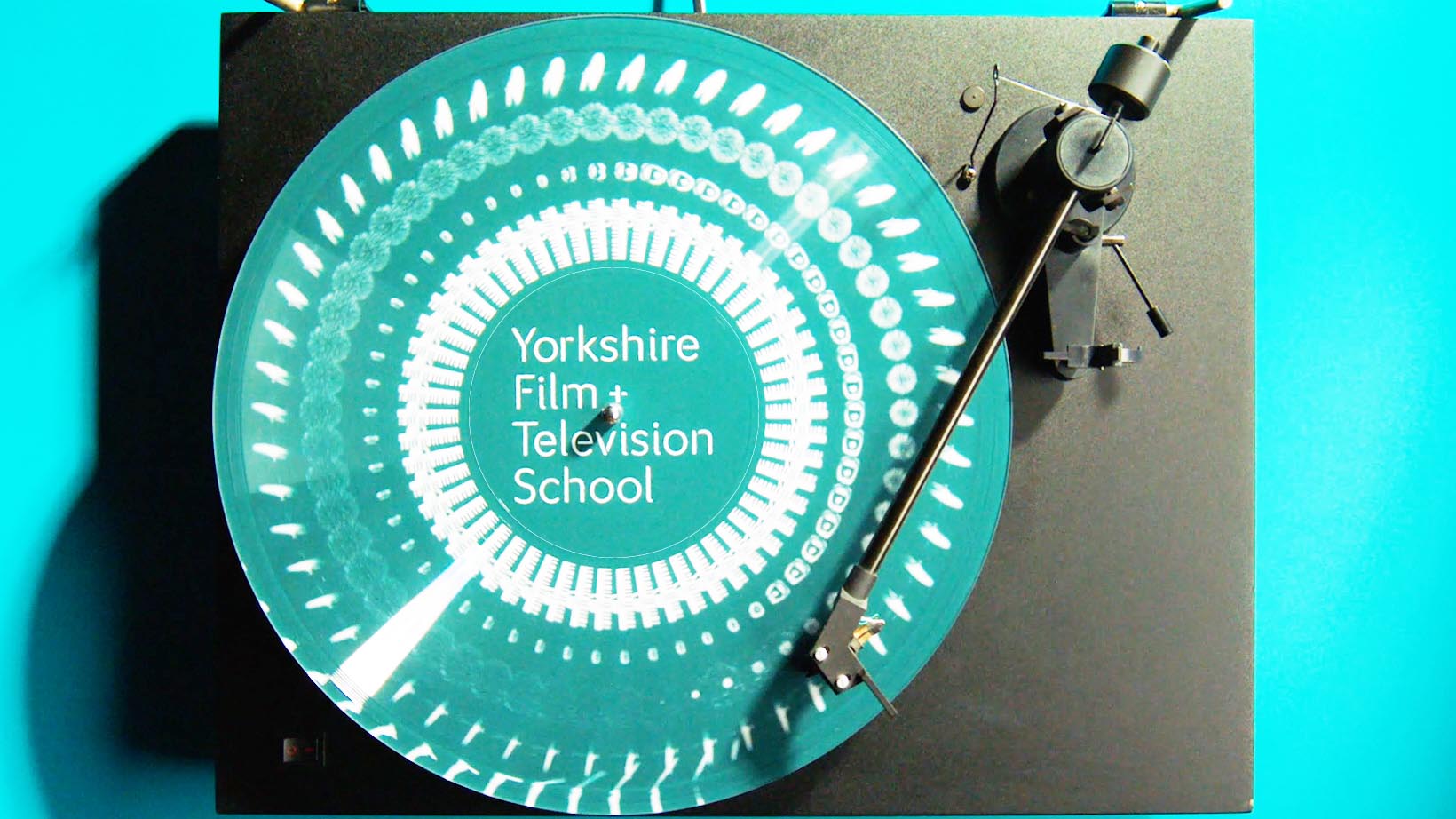
Music and Sound for Screen BA(Hons)
Start Dates
21 September 2026
Duration
3 years full-time 4 years inc. placement year
UCAS Tariff
120-104
Overview
Why choose Huddersfield for this course?
- Full access to professional-standard studios and audiovisual production facilities outside teaching hours
- Compose, design, and produce music and sound for film, TV, and games using professional studios and open-access facilities.
- Collaborate with a vibrant creative community across music, performance, and film courses
Our Music and Sound for Screen BA(Hons) course equips you with the skills to compose music, create sound effects, and design audio for film, television, and games. Combining composition, orchestration, recording, performance, and sound design, this professionally accredited course prepares you to work across the full range of audiovisual media.
You’ll study in a School recognised for excellence — Music at Huddersfield is ranked 8th in the UK (Daily Mail University Guide 2026) and the School has won the Queen’s Anniversary Prize for world-leading work promoting contemporary music internationally. Huddersfield is also ranked 37th in the world for Performing Arts (QS World University Subject Rankings 2025).
Our course is centred on state-of-the-art professional-standard facilities, with access to a variety of recording studios, composition labs, and audio production suites. Students enjoy open access outside of teaching, allowing you to experiment, refine, and realise your creative projects independently, supported by expert technical staff.
You’ll learn the full range of audiovisual skills, including film and game music composition, sound design, Foley, orchestration for live and virtual instruments, sample library creation, and sound editing. Projects emphasise creativity, technical precision, and professional practice, giving you a portfolio of work ready for industry engagement.
You’ll have opportunities to perform and explore the latest new music at the Huddersfield Contemporary Music Festival (HCMF) and experience cutting-edge experimental artists at the Electric Spring Festival. Teaching is led by commercially active staff, internationally recognised researchers, and visiting artists, including professional film composers and sound designers, ensuring you gain insight into current industry practice. You’ll also have the option to undertake industry placements, giving you real-world experience and helping to establish professional contacts.
Graduates from this course are well-prepared for careers in film, television, games, music composition, sound design, audio post-production, media industries, or further study.
Career opportunities after the course *
Audiovisual Technician
Video Editor
Technician
Music Producer
Performer
*Lightcast
Entry Requirements
BBB-BCC at A Level.
120-104 UCAS tariff points from a combination of Level 3 qualifications.
Merit at T Level.
DDM-DMM in BTEC Level 3 Extended Diploma.
Merit in UAL Level 3 Extended Diploma.
Merit in RSL Level 3 Extended Diploma.
Practical and theory music grades 6-8 will be accepted in the total points.
Access to Higher Education Diploma with 45 Level 3 credits at Merit or above.
120-104 UCAS tariff points from International Baccalaureate qualifications.
Entry is also possible for applicants who don't hold standard UK qualifications.
International and mature applicants who don't hold standard UK qualifications can provide a portfolio to demonstrate skills relevant to the course. You can do this by sending us links to any production and/or recording work you have created or collaborated in.
If your first language is not English, you will need to meet the minimum requirements of an English Language qualification. The minimum for IELTS is 6.0 overall with no element lower than 5.5, or equivalent. Read more about the University’s entry requirements for students outside of the UK on our International Entry Requirements page.
Other suitable experience or qualifications will be considered. For further information please see the University's minimum entry requirements.
If you do not have the appropriate qualifications for direct entry to this degree you may be able to apply to our Music and Performing Arts Foundation Pathway Degree.
Course Details
Teaching and Assessment
Discover what to expect from your tutor contact time, assessment methods, and feedback process.
Global Professional Award
At Huddersfield, you’ll study the award-winning Global Professional Award (GPA) alongside your degree* — so you’re ready for the career you want, whatever subject you choose.
Placements
This course offers you the opportunity to take an optional one-year (48 week) work placement after your second year, in the UK or abroad. This provides an opportunity for you to relate theory to practice and to develop skills in a real work environment. Our teaching staff have developed excellent links with local employers and will help you to find a suitable placement if necessary.
Previous placement providers have included Warner Music, Pinewood Studios (Avid), WigWam, Angel Studios, Shoot Productions, the Institute for Music/Acoustic Research and Co-ordination (IRCAM) in Paris, as well as schools, audio electronics companies, radio stations and various media and production houses.
My placement has given me a huge insight into the process of working as a musician in so many different spaces in the industry; such as, composing music for film and TV, recording and presenting concerts of original music.
- Jay Witsey
Creative Music Technology BMus(Hons)
Your Career
Previous graduates have prepared themselves for what is known as a portfolio career, setting up their own sound/music for image company; providing orchestral scores and arrangements for recording sessions, original soundtracks, library music and sound effects. They may also undertake bespoke sound design for clients. Some students have developed sample packs and set up a production company in their placement year making a smooth transition from being student entrepreneurs to professionals. There is support available after you graduate from our 3M Buckley Innovation Centre where you can get advice on starting your own business. The university also supports students to progress to postgraduate and research study.
A selection of companies that have employed Huddersfield graduates in recent years include Abbey Road Studios, Calrec Audio, ITV, BBC, Kiss FM, British Grove Studios and Metrophonic.**
**Source: LinkedIn
75-95%
Percent of graduates from these subject areas were in work or further study 15 months after graduation
* HESA Graduate Outcomes 22/23, UK Domiciled
The course covered a lot of ground I would never have thought relevant to my degree but not only did it expand my research ability it prepared for the working environment and daily obstacles that come with it.
- Dominic Murry
Music and Sound for Image BA(Hons) graduate. Now a Sound Engineer at Deafinitions Organisation
Fees and Finance
This information is for Home students applying to study at the University of Huddersfield in the academic year 2026/27.
Please note that tuition fees for subsequent years may rise in line with inflation (RPI-X) and/or Government policy.
From January 2027 the UK government is launching a new student funding system for people starting university education. Read more about the Lifelong Learning Entitlement (LLE).
For detailed information please visit https://www.hud.ac.uk/study/fees/
This information is for international students applying to study at the University of Huddersfield in the academic year 2026/27.
Please note that tuition fees for subsequent years may rise in line with inflation (RPI-X) and/or Government policy.
For detailed information please visit https://www.hud.ac.uk/international/fees-and-funding/
Home
The tuition fee for a placement year is £1000. If you go on work experience or work placement, you will need to fund your own travel and/or accommodation costs to and from the placement. Please be aware that if your placement is outside of the UK, you will still be responsible for your travel and living expenses and may need to consider issues like health care and insurance costs.
International
The tuition fee for a placement year is £3,300. If you go on work experience or work placement, you will need to fund your own travel and/or accommodation costs to and from the placement. Please be aware that if your placement is outside of the UK, you will still be responsible for your travel and living expenses and may need to consider issues like health care and insurance costs.
Scholarships and Bursaries
Discover what additional help you may be eligible for to support your University studies.
Tuition Fee Loans
Find out more about tuition fee loans available to eligible undergraduate students.
What’s included in your fee?
We want you to understand exactly what your fees will cover and what additional costs you may need to budget for when you decide to become a student with us.
If you have any questions about Fees and Finance, please email the Student Finance Team.
Gallery
See below for a glimpse at some of our facilities
Explore More
Why Hud
Explore the unique opportunities and resources that make our institution a top choice for students seeking a well-rounded and future-focused education.
More Info
Careers support
We know you’re coming to university to study on your chosen subject, meet new people and broaden your horizons. However, we also help you to focus on life after you have graduated to ensure that your hard work pays off and you achieve your ambition.
Find out more about careers supportStudent support
At the University of Huddersfield, you’ll find support networks and services to help you get ahead in your studies and social life. Whether you study at undergraduate or postgraduate level, you’ll soon discover that you’re never far away from our dedicated staff and resources to help you to navigate through your personal student journey.
See our support servicesTeaching Excellence
Great teaching is engaging and inspiring — it helps you reach your full potential and prepares you for the future. We don’t just teach well — we excel — and we have the awards and recognition to prove it.
Find out moreInspiring Academics
Our researchers carry out world-leading work that makes a real difference to people’s lives. Staff within the Department of Media, Humanities and the Arts may teach you on this course.
Find out more about our staffResearch Excellence
You’ll be taught by staff who want to support your learning and share the latest knowledge and research.
Find out moreAccommodation
Looking for student accommodation? Huddersfield has you covered. HudLets has a variety of accommodation types to choose from, no matter what your preference. HudLets is the University’s approved accommodation service, run by Huddersfield Students’ Union.
Take a look at your optionsFurther Study
If you want to continue your learning beyond your undergraduate degree, there is a range of financial support available for postgraduate study, including discounts for Huddersfield graduates.
Discover postgraduate coursesLegal information
When you enrol as a student of the University, your study and time with us will be governed by our terms and conditions, Handbook of Regulations and associated policies. It is important that you familiarise yourself with these as you will be asked to agree to them when you join us as a student. You will find a guide to the key terms here, along with the Student Protection Plan.
Although we always try and ensure we deliver our courses as described, sometimes we may have to make changes for the following reasons:
Changes to a course you have applied for but are not yet enrolled on
If we propose to make a major change to a course that you are holding an offer for, then we will tell you as soon as possible so that you can decide whether to withdraw your application prior to enrolment. We may occasionally have to withdraw a course you have applied for or combine your programme with another programme if we consider this reasonably necessary to ensure a good student experience, for example if there are not enough applicants. Where this is the case we will notify you as soon as reasonably possible and if you are unhappy with the change we will discuss with you other suitable courses we can transfer your application to. If you do not wish to transfer to another course with us, you may cancel your application and we will refund you any deposits or fees you have paid to us.
Changes to your course after you enrol as a student
Changes to option modules
Where your course allows you to choose modules from a range of options, we will review these each year and change them to reflect the expertise of our staff, current trends in research and as a result of student feedback or demand for certain modules. We will always ensure that you have an equivalent range of options to that advertised for the course. We will let you know in good time the options available for you to choose for the following year.
Major changes
We will only make major changes to non-optional modules on a course if it is necessary for us to do so and provided such changes are reasonable. A major change is a change that substantially changes the outcomes, or a significant part of your course, such as the nature of the award or a substantial change to module content, teaching days (part time provision), type of delivery or assessment of the core curriculum. For example, it may be necessary to make a major change to reflect changes in the law or the requirements of the University’s regulators or a commissioning or accrediting body. We may also make changes to improve the course in response to student, examiners’ or other course evaluators’ feedback or to ensure you are being taught current best practice. Major changes may also be necessary because of circumstances outside our reasonable control, such as a key member of staff being unable to teach due to illness, where they have a particular specialism that can’t be adequately covered by other members of staff; or due to pandemics, other disasters (such as fire, flood or war) or changes made by the government.
Major changes would usually be made with effect from the next academic year, but may happen sooner in an emergency. We will notify you as soon as possible should we need to make a major change and will consult with affected groups of students and any changes would only be made in accordance with our regulations. If you reasonably believe that the proposed change will cause you detriment or hardship we will, if appropriate, work with you to try to reduce the adverse effect on you or find an appropriate solution. Where an appropriate solution cannot be found and you let us know before the change takes effect you can cancel your registration and withdraw from the University without liability to the University for any additional tuition fees. We will provide reasonable support to assist you with transferring to another university if you wish to do so and you may be eligible for an exit award depending on how far through your course you are.
In exceptional circumstances, we may, for reasons outside of our control, be forced to discontinue or suspend your course. Where this is the case, a formal exit strategy will be followed in accordance with the student protection plan.
The Office for Students (OfS) is the principal regulator for the University.


